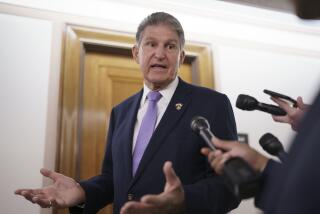Unity on Health Plan Eludes Senate GOP : Reform: Republicans are split on whether system needs complete overhaul or only minor adjustments.
- Share via
ANNAPOLIS, Md. — Senate Republicans, hoping to capitalize on the apparently fading fortunes of President Clinton’s health plan, tried to close divisions within their ranks but emerged Friday from a two-day retreat here apparently no closer to agreement.
Senate Minority Leader Bob Dole (R-Kan.) said the 36 Republicans who attended the meeting were united in their common goal to make “health care affordable for all Americans and accessible for all Americans.”
However, they remain at odds over whether that requires a total overhaul of the U.S. health care system and a guarantee of coverage for all, as some of them argue, or whether it can be accomplished, as others say, by correcting a few critical flaws in the current arrangement.
Clinton hopes that the bloc of Republicans favoring more sweeping change will remain intact, because it offers him a chance of winning at least some GOP votes for whatever version of his plan emerges from the Democratic-controlled committees in the House and Senate. The first of those panels, the House Ways and Means health subcommittee, is scheduled to begin its work next week.
Also attending the session were three GOP governors and a handful of House members, as well as several Republican political consultants, pollsters and lobbyists.
Rep. Newt Gingrich (R-Ga.), the second-ranking House Republican, said that the disarray among Democrats, coupled with the Republicans’ intent to be involved in the issue, could open a rare opportunity for the two parties to work together.
“There’s much more desire to write a bipartisan bill than I had expected,” said Gingrich, who is generally among the most partisan and combative Republicans. “I think in the next week, you’ll see us reach out to the Democrats.”
Republicans are heartened by recent polls that indicate growing public uneasiness over the Clinton plan--a fear that most Americans will pay higher premiums for lower-quality care.
But most of the GOP legislators seem to believe that they must do more than simply oppose the Clinton plan. Such a strategy would raise the risk that Americans would view their party as simply obstructionist and not sensitive to the hardships of the current health system.
In the Senate, where their 44 votes are enough to block most legislation, the Republicans are likely to be able to influence the shape of any health bill that emerges. That is particularly true because the Democrats are so deeply split on the issue.
Different factions within the GOP have advanced widely divergent options--ranging from the sweeping alternative proposed by moderate Sen. John H. Chafee (R-R.I.) that would achieve universal coverage by requiring individuals to have coverage, to the minimalist plan of staunchly conservative Sen. Phil Gramm (R-Tex.) that emphasizes health care savings accounts.
“I think there’s more of a possibility of us getting together than I originally would have thought,” Chafee said.
“We made progress here,” Gramm agreed. “We all recognize the President’s health care plan is dead, because the American people rejected it.”
However, when pressed to cite areas where they had reached agreement where none had existed before, the participants in the meeting offered no specifics.
More to Read
Get the L.A. Times Politics newsletter
Deeply reported insights into legislation, politics and policy from Sacramento, Washington and beyond. In your inbox twice per week.
You may occasionally receive promotional content from the Los Angeles Times.










